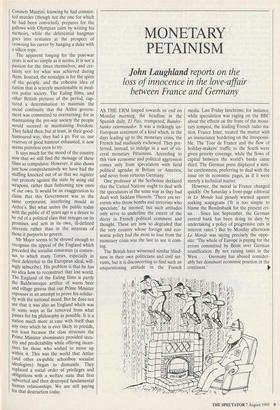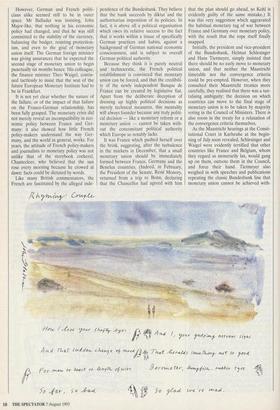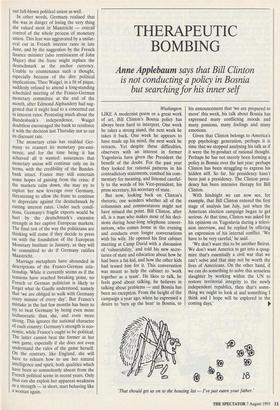MONETARY PETAINISM
John Laughland reports on the
loss of innocence in the love-affair between France and Germany
AS THE ERM limped towards its end on Monday morning, the headline in the Spanish daily, El Pais, trumpeted, Bundes- banko exterminador. It was a strikingly un- European sentiment of a kind which, in the days leading up to the monetary crisis, the French had studiously eschewed. They pre- ferred, instead, to indulge in a sort of vis- ceral monetary Petainism. According to this view economic and political aggression comes only from speculators with lurid political agendas in Britain or America, and never from virtuous Germany.
One professor at the Sorbonne declared that the United Nations ought to deal with the speculators in the same way as they had dealt with Saddam Hussein. 'There are ter- rorists who throw bombs and terrorists who speculate,' he intoned; but such attitudes only serve to underline the extent of the decay in French political comment and thought. These are now so degraded that the very country whose foreign and eco- nomic policy had the most to lose from the monetary crisis was the last to see it com- ing. The British have witnessed similar blind- ness in their own politicians and civil ser- vants, but it is disconcerting to find such an unquestioning attitude in the French media. Last Friday lunchtime, for instance, while speculation was raging on the BBC about the effects on the franc of the mone- tary tempest, the leading French radio sta- tion, France Inter, treated the matter with an insouciance bordering on the irresponsi- ble. The Tour de France and the flow of holiday-makers' traffic to the South were given priority coverage, while the flows of capital between the world's banks came third. The German press displayed a simi- lar carelessness, preferring to deal with the issue on its economic pages, as if it were merely a technical matter.
However, the mood in France changed quickly. On Saturday a front-page editorial in Le Monde had piously warned against seeking scapegoats ('It is too simple to blame the Bundesbank for the present cri- sis . . . Since last September, the German central bank has been doing its duty by undertaking a policy of progressive cuts in interest rates.') But by Monday afternoon Le Monde was saying precisely the oppo- site: 'The whole of Europe is paying for the errors committed by Bonn over German reunification. By not raising taxes in the West . . . Germany has abused consider- ably her dominant economic position in the continent.'
However, German and French politi- cians alike seemed still to be in outer space. Mr Balladur was insisting, John Major-like, that nothing in his economic policy had changed, and that he was still committed to the stability of the currency, balancing the budget, resisting protection- ism, and even to the goal of monetary union itself. The German foreign minister was giving assurances that he expected the second stage of monetary union to begin punctually six months hence. His colleague, the finance minister Theo Waigel, contin- ued tactlessly to insist that the seat of the future European Monetary Institute had to be in Frankfurt.
It is not yet clear whether the nature of the failure, or of the impact of that failure on the Franco-German relationship, has been fully grasped. The monetary crisis did not merely reveal an incompatibility in eco- nomic policy between France and Ger- many: it also showed how little French policy-makers understand the way Ger- many, and the world in general, works. For years, the attitude of French policy-makers and journalists to monetary policy was not unlike that of the storybook cockerel, Chantecleer, who believed that the sun rose every morning because he crowed at dawn: facts could be dictated by words.
Like many British commentators, the French are fascinated by the alleged inde-
pendence of the Bundesbank. They believe that the bank succeeds by diktat and the authoritarian imposition of its policies. In fact, it is above all a political organisation which owes its relative success to the fact that it works within a tissue of specifically German practices and habits, against a background of German national economic consciousness, and is subject to overall German political authority.
Because they think it is purely neutral and technocratic, the French political establishment is convinced that monetary union can be forced, and that the credibili- ty of the newly independent Banque de France can be created by legislative fiat. Apart from the deliberate deception of dressing up highly political decisions as merely technical measures, this mentality will always founder because any truly politi- cal decision — like a monetary reform or a monetary union — cannot be taken with- out the concomitant political authority which Europe so notably lacks.
It was France which pushed herself over the brink, suggesting, after the turbulence in the markets in December, that a small monetary union should be immediately formed between France, Germany and the Benelux countries. (Indeed, in February, the President of the Senate, Rene Monory, returned from a trip to Bonn, declaring that the Chancellor had agreed with him that the plan should go ahead, so Kohl is evidently guilty of the same mistake.) It was this very suggestion which aggravated the habitual monetary tug of war between France and Germany over monetary policy, with the result that the rope itself finally snapped.
Initially, the president and vice-president of the Bundesbank, Helmut Schlesinger and Hans Tietmeyer, simply insisted that there should be no early move to monetary union, and that neither the Maastricht timetable nor the convergence criteria could be pre-empted. However, when they consulted their Maastricht treaties more carefully, they realised that there was a tan- talising ambiguity: the decision on which countries can move to the final stage of monetary union is to be taken by majority voting in the Council of Ministers. There is also room in the treaty for a relaxation of the convergence criteria themselves.
As the Maastricht hearings at the Consti- tutional Court in Karlsruhe at the begin- ning of July soon revealed, Schlesinger and Waigel were evidently terrified that other countries like France and Belgium, whom they regard as monetarily lax, would gang up on them, outvote them in the Council, and force their hand. Tietmeyer also weighed in with speeches and publications repeating the classic Bundesbank line that monetary union cannot be achieved with- out full-blown political union as well.
In other words, Germany realised that she was in danger of losing the very thing she valued most in Maastricht — overall control of the whole process of monetary union. This fear was aggravated by a unilat- eral cut in French interest rates in late June, and by the suggestion by the French finance minister (also reminiscent of John Major) that the franc might replace the deutschmark as the anchor currency. Unable to countenance such a thought, especially because of the dire political implications, Theo Waigel, in a fit of pique, suddenly refused to attend a long-standing scheduled meeting of the Franco-German monetary committee at the end of the month, after Edmond Alphandery had sug- gested that it might lead to a concerted cut in interest rates. Protesting much about the Bundesbank's independence, Waigel doubtless encouraged the bank to reinforce it with the decision last Thursday not to cut its discount rate.
The monetary crisis has enabled Ger- many to reassert its monetary pre-emi- nence, and for the time being it has achieved all it wanted: assurances that monetary union will continue only on its terms, with the credibility of the Bundes- bank intact. France may still entertain some hopes of gaining from the crisis: if the markets calm down, she may try to exploit her new leverage over Germany, threatening to allow the franc to continue to depreciate against the deutschmark by cutting interest rates. Under such condi- tions, Germany's fragile exports would be hurt by the deutschmark's excessive strength in her captive European markets. The final test of the way the politicians are thinking will come if they. decide to press on with the foundation of the European Monetary Institute in January, as they will be committed to do if Germany ratifies Maastricht.
Marriage metaphors have abounded in descriptions of the Franco-German rela- tionship. While it currently seems as if the tensions have reached breaking point, no French or German politician is likely to forget what de Gaulle understood, namely that 'we are obliged to walk with Germany every minute of every day'. But France's mistake in the last few months has been to try to beat Germany by being even more technocratic than she, and even more strong. This ignores the national character of each country: Germany's strength is eco- nomic, while France's ought to be political. The latter cannot beat the former at her own game, especially if she does not even understand the rules of the game herself. On the contrary, like England, she will have to relearn how to use her natural Intelligence and spirit, both qualities which have been so somnolently absent from the French political scene in recent years. Only thus can she exploit her apparent weakness as a strength — in short, start behaving like a woman again.




















































 Previous page
Previous page